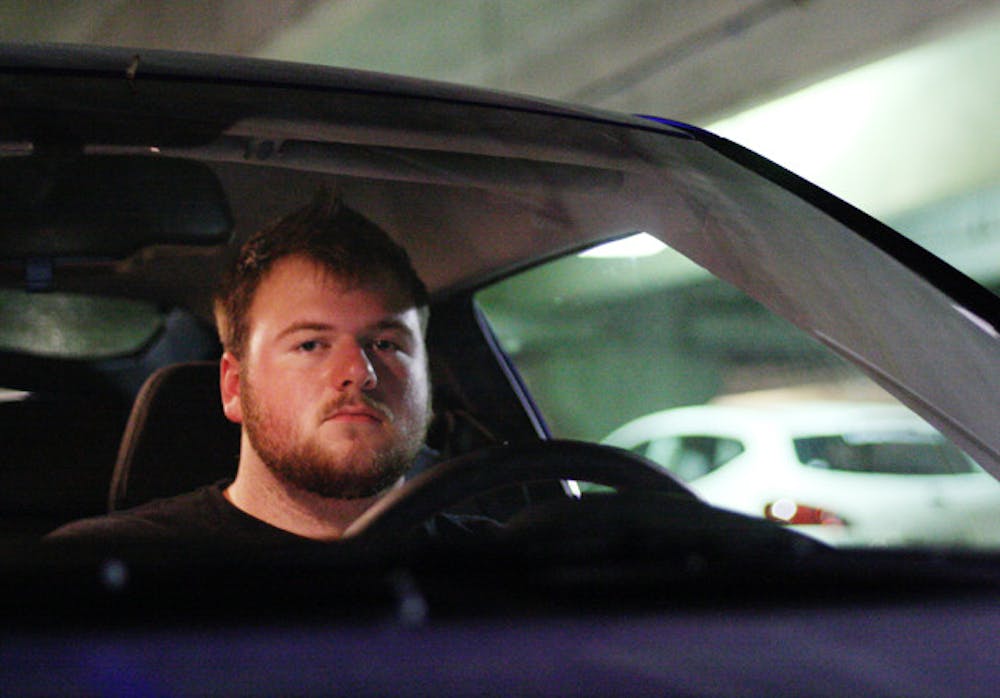For Samantha Scille, off-campus has a whole other meaning.
Scille, a 20-year-old pre-occupational therapy junior, lives in Ocala and commutes to UF. For students like Scille, commuting can present a special set of problems.
For Patty Roesch, a 22-year-old journalism junior, the hour drive to Chiefland isn't the worst part. It's the parking.
Brock Seng, a 19-year-old journalism sophomore, trained himself to get through a 14-hour day without eating. There's just no time to wait in long lines for expensive meals.
Each student has a routine that helps them weather the headache of asphalt and axles.
Four days a week, Scille wakes up at 5:30 a.m., eats a bowl of Vanilla Bunches of Oats, hops in her car and treks north on U.S. Highway 441 toward Gainesville.
She cranks up the radio to The JOY FM or puts in a CD from her church choir and belts songs to stay awake. She pulls into Gainesville around 8 a.m.
First class: statistics 2.
Roesch is up by 7 a.m. and out the door by 7:50. She streams Adele, Tim McGraw and Cream on Pandora. A microwave-sized cooler full of cheese, crackers and other snacks sits in her passenger seat.
Seng rises at 7 a.m., cooks a hearty breakfast of eggs, bacon and hash browns and leaves by 9:10 a.m.
He likes to have Mayday Parade and other punk bands thumping through the speakers.
Once the students get to campus, all three drive to the Park-and-Ride lot across the street from Southwest Recreation Center and next to the Samuel P. Harn Museum of Art.
As undergraduate commuters, their only parking option on campus is to buy a Park-and- Ride parking pass.
Ron Fuller, associate director of Transportation and Parking Services at UF, said the Park-and-Ride lot almost always has open spaces - particularly the parking garage.
"That garage is vastly underutilized," Fuller said. "There's plenty of parking out there."
From the lot, they catch a bus to their classes on the east side of campus.
Fuller said his department pays for the nine RTS campus routes. He said the department makes a concerted effort to make sure students don't have to wait long for a bus from the Park-and-Ride lot. He said there's usually a bus at the lot within seven to 10 minutes.
Seng said the trip from the parking lot to his 10:40 a.m. Introduction to Astronomy class isn't too difficult.
He drives directly to the third level of the Park-and-Ride parking garage, waits about five minutes for a bus and reads a book or notes off his iPad during the ride.
He said it's fair that he can't get a parking pass for a better space because he is technically an off-campus student.
"We're not paying the university to live there," he said.
Between classes, Scille works on homework for Applied Human Development 1 or Introduction to U.S. Healthcare System.
If it's after 5 p.m., Roesch moves her car so she won't have to worry when certain buses stop running.
Seng works on his novel about a college student's four-year experience.
They get through it because they have to. Living in Gainesville either isn't an option or isn't appealing, so they work out the commute the best they can.
"I don't really have a choice," Scille said.
She has family members in Ocala that help care for her 18-month-old daughter, Shondrea. She has a job at a ticket office for a performance hall in On Top of The World Communities, an Ocala active-adult living community, that she enjoys and that fits with her class schedule.
Roesch's dad owns a home in Chiefland, so she lives there for free. Her only bills are electric, cable and gas for her car and motorcycles.
The gas is about $250 a month, but she said the total is still cheaper than an apartment with full utilities.
Seng's mom lives in Ocala, so he stays with her.
He lived in an off-campus apartment during the spring semester. He said the experience isn't much different now.
"I think it's almost better this way," he said. "I didn't like living in Gainesville, actually. It was too expensive."
The university doesn't keep definitive records on the number of commuter students at UF. The main way to determine whether a student lives outside Gainesville - his or her address - may not accurately determine where the student lives. The student may have a parent's address on file rather than his or her Gainesville address, which would change the statistics, said Steve Orlando, UF spokesman.
Scille said she knows four or five people in her pre-occupational therapy program who commute. They compare driving times - all of them from 30 minutes to an hour - and how early each of them have to wake up. She's among the earliest.
The experience at UF differs from person to person.
Seng said he's content with his situation.
Roesch said she would like to see the university have a special parking lot for undergraduate commuter students.
Scille said she's had to do almost everything in life for herself, so she doesn't worry about the university doing anything for her.
"The university doesn't personally do anything for me other than give me a place to learn," she said.
Brock Seng, a 19-year-old journalism sophomore, commutes to campus for class from his mom's house in Ocala.






